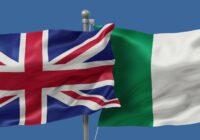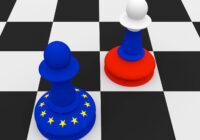The heads of state and government of the European Union propose introducing a “carbon border adjustment mechanism” from 2023, to charge imported goods according to the CO2 emitted during their production. At their recent summit, they decided to use the ensuing revenues to boost the EU’s budget. This gives a fiscal twist to an instrument actually designed for climate policy.
Ursula von der Leyen, the president of the European Commission, had already announced in 2019 that she would like to introduce a “carbon border tax” as part of her European Green Deal. In spring 2020, the commission launched a roadmap process to prepare concrete legislative proposals by 2021. Its proposal also responds to fears that higher European CO2 costs caused by EU emissions trading (EU ETS) could cause companies to relocate activities outside the union, causing carbon leakage.
Russia Has Planted Seeds of the EU’s Demise in the Balkans
Outsourcing would contribute to reducing European emissions, but not to tackling the global problem. To date, the European Union has addressed the risk of relocation by allocating free emission allowances to sectors at risk of carbon leakage. A CO2 border adjustment could create an alternative with a global impact.
There is rising support for the idea, after years of resistance from many EU member states and business associations. And the pressure is set to grow, with an increase in the EU’s climate target for 2030 — and anticipated higher CO2 costs for EU businesses — expected this fall. Furthermore, a CO2 border adjustment for foreign products will be widely interpreted as a clear message, especially to Washington and Beijing, that the EU intends to implement the 2015 Paris Agreement. When designing the instrument, it will be important to comply with World Trade Organization (WTO) rules and to get important trading partners on board.
WTO-Compatible Design
The European Commission proposes three ways in which a “carbon border adjustment mechanism” could be implemented: “a carbon tax on selected products, a new carbon customs duty or the extension of the EU ETS to imports.” From a trade law perspective, any of these options could be designed in accordance with WTO rules. The crucial aspect is the principle of non-discrimination: that a CO2 border adjustment must not differentiate among like products or between WTO members. If it were necessary to depart from the principle, for example, where a trading partner or individual company is able to demonstrate that it is already taking care of emissions reductions, the rules for exceptions would need to be observed.
An EU-wide CO2 “product tax” and its implementation by the EU member states would be the most straightforward approach from a trade law perspective. To do this, the EU would first have to levy a CO2 tax on goods manufactured in the European Union. Then, it would be unproblematic to apply this tax to imports as well — the value-added tax, for example, follows this approach. Imported “like” products would be treated the same way as domestic products, which is WTO-compliant.
Extending the EU ETS to industrial imports would be more complex. The task for the European. Commission would be to demonstrate that under trade law, the CO2 allowance price is ultimately equivalent to a “product tax.” Failing that, the commission could argue that it was acting to protect a global resource, i.e., that avoiding carbon leakage was the central aim of the EU legislation. The “conservation of exhaustible natural resources,” which includes the Earth’s atmosphere, is a valid ground for violating WTO principles, subject to certain conditions. Such an exemption would also have to be claimed for a new CO2 customs duty.
However, the European Council decision has exacerbated the risk that WTO dispute settlement panels will regard the new instrument as a means of generating income, rather than a means to protect the climate. This would make a difference if trading partners challenged the new tool. The climate focus, which would be taken into account in WTO rulings, is currently slipping into the background.
Don’t Underestimate the Diplomatic Effort
A CO2 border adjustment mechanism will need extensive explanation given the many open details, and it can only promote international climate policy cooperation if trade partners are informed at an early stage and regularly consulted. For this, the European Union should use WTO forums and the climate regime as well as other international organizations. In 2012, the European Commission was made painfully aware of the difficulties involved in going it alone, after seeking to include international aviation in the EU ETS. Major partners put political pressure on the EU, even threatening sanctions, and the union decided to backtrack and reduce the coverage of the ETS to flights within the European Economic Area.
Trust can only arise if the EU adheres to multilateral climate and trade agreements — i.e., supports the Paris Agreement and the troubled WTO and expresses this clearly and often. This task has probably become much more difficult after the European Council decision because a fiscally-motivated border adjustment cannot be convincingly attributed to these multilateral concerns — especially as the revenues would flow to the EU rather than to funds supporting climate protection, for example, in poorer countries. If a CO2 border adjustment specifically targeted cement, steel and other energy-intensive industries, as has already been discussed, producers from emerging and industrialized countries would be especially affected.
The union should start discussions with these countries without delay. A good opportunity will arise at the meeting of G20 finance ministers in Saudi Arabia toward the end of the year. In addition, the EU should insist to the US that this initiative is not intended as a provocation in the smoldering customs dispute. Ultimately, the climate policy success of a CO2 border adjustment will depend on how the world’s major economies react to it.
*[This article was originally published by the German Institute for International and Security Affairs (SWP), which advises the German government and Bundestag on all questions relating to foreign and security policy.]
The views expressed in this article are the author’s own and do not necessarily reflect Fair Observer’s editorial policy.
Support Fair Observer
We rely on your support for our independence, diversity and quality.
For more than 10 years, Fair Observer has been free, fair and independent. No billionaire owns us, no advertisers control us. We are a reader-supported nonprofit. Unlike many other publications, we keep our content free for readers regardless of where they live or whether they can afford to pay. We have no paywalls and no ads.
In the post-truth era of fake news, echo chambers and filter bubbles, we publish a plurality of perspectives from around the world. Anyone can publish with us, but everyone goes through a rigorous editorial process. So, you get fact-checked, well-reasoned content instead of noise.
We publish 2,500+ voices from 90+ countries. We also conduct education and training programs
on subjects ranging from digital media and journalism to writing and critical thinking. This
doesn’t come cheap. Servers, editors, trainers and web developers cost
money.
Please consider supporting us on a regular basis as a recurring donor or a
sustaining member.
Will you support FO’s journalism?
We rely on your support for our independence, diversity and quality.






